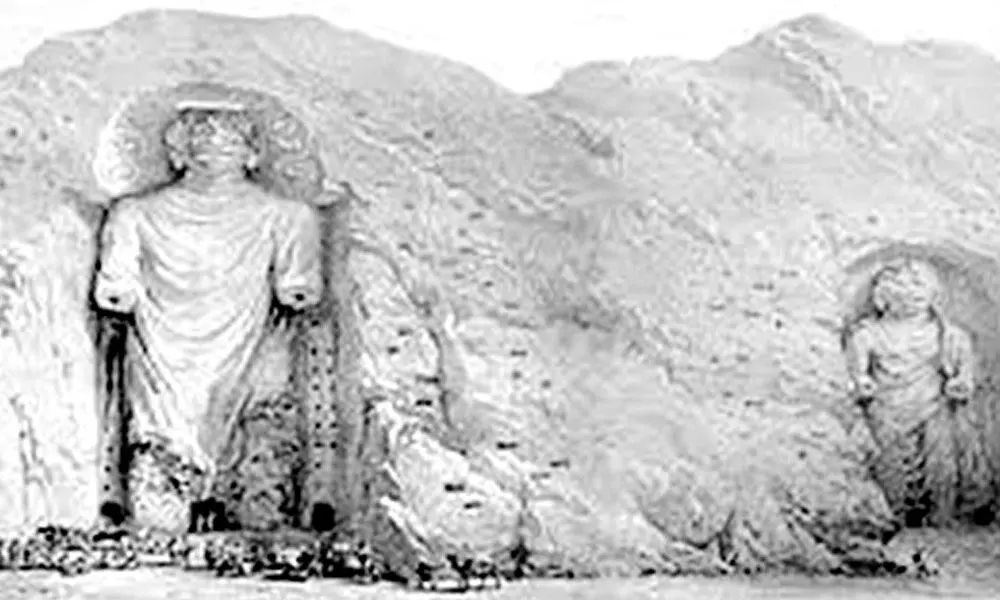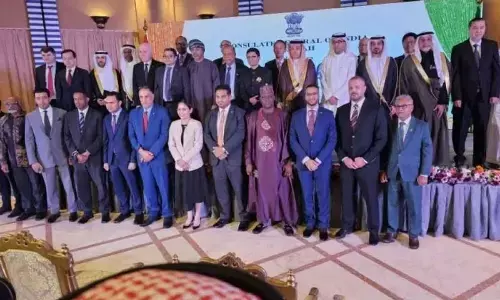Will Afghan ancient historical sites again face Talib threats?

Will Afghan ancient historical sites again face Talib threats?
While there is a widespread speculation as to what awaits Afghanistan after the departure of the US-led foreign troops in the country, historians and heritage experts globally, are keeping their fingers crossed as to the fate of cultural legacy of the embattled nation
While there is a widespread speculation as to what awaits Afghanistan after the departure of the US-led foreign troops in the country, historians and heritage experts globally, are keeping their fingers crossed as to the fate of cultural legacy of the embattled nation.
The concern is justified since Afghanistan's rich historical and cultural heritage dates back to several centuries. From being part of Indus Valley Civilisation to being invaded by Alexander, several empires including Greco-Bactrians, Kushans, Saffarids, Ghaznavids, Timurids, and Mughals among others have started from this region.
According to an article in National Geographic some cultural heritage experts are hopeful; others are growing anxious with the forthcoming departure of US and European forces.
The fear on the part of those who are tasked with taking care of the nation's uniquely diverse cultural heritage is not unfounded. It is still fresh in their memory, as it is of others, when the Taliban in 2001, destroyed the planet's largest statues, the Bamiyan Buddhas. They also vandalised the National Museum in Kabul and looted antiques from ancient sites. Their attitude towards the past relics, especially the pre-Islamic ones, portrayed them in a bad light at the international level.
This time, however, there appears to be a change as Taliban have given their word to respect the nation's history. In a statement they commanded their followers to "robustly protect, monitor and preserve" relics, halt illegal digs, and safeguard "all historic sites." But time will tell whether the commitment is only tactical, to reduce the resistance of the world community to their re-emergence or a genuine change of heart born out the bitter experience of the past.
Interestingly, they have forbidden selling of artefacts in the art market. Their statement said: "No one should try to disturb such sites or think about using them for profit."
According to the NG article, the statement did not come as a surprise to Cheryl Benard of Washington-based Alliance for the Restoration of Cultural Heritage (ARCH). The write-up states that she told her group last fall that both sides need to address the issue.
Not everyone shares this optimism. Afghanistan's Institute of Archaeology's Noor Agha Noori is not convinced. He told NG: "To be honest, we are very worried about the future of cultural heritage were the Taliban to come into power," he said while informing that Islamists were indulging in looting historical sites in order to raise finances.
Speaking in the same vein, Mohammad Fahim Rahimi, Director of Kabul's National Museum observed: "Unfortunately the statement is not clear, especially concerning the pre-Islamic heritage. You know what happened to the collection during the civil war and in 2001."
The museum conservators over the years painstakingly pieced together many wooden and stone sculptures which were broken deliberately.
There are many who pin their hopes on the US brokered talks between the Taliban and the Afghan Government hoping that the region's past will be protected. Last year, the Government had said yes to discuss "ensuring the security of historical and Islamic sites" during their talks while the statement of February gives an indication on part of Taliban to do so as well.
Nasratullah Hewadwall of the Kabul branch of ARCH remarked: "It's a great and positive step." He shared that last year the Taliban had distanced itself from the destruction of Bamiyan Buddhas in 2001 while blaming it on al Qaeda.
According to Hewadwall, the leadership of the group has realised the economic significance of ancient heritage and sites as tourist attractions while perceiving that destroying them damages their image.
In terms of historical significance, there is much to be lost in case Afghanistan's cultural heritage is not preserved. Being at the geographical crossroads of Central Asia, the region has attracted traders, merchants, scholars, pilgrims, and armies since the arrival of Alexander the Great.
Afghanistan is from where Buddhism spread to China and it is this place where Zoroastrianism, Christianity, Judaism, and Hinduism flourished, both before and after the advent of Islam in the 7th Century AD.
Also as part of the Silk Road which connected India with China and Iran, it boasts of remains of several ancient cities, monasteries, and sarais, which housed travellers.
Besides the threat of the Taliban, a greater fear which grips cultural conservators is that of chaos that will follow after the departure of American and NATO troops that has already begun.
According to Jolyon Leslie, who is working as a preservationist at an ancient Buddhist stupa outside Kabul: "Our fears are less about a possible threat posed by the Taliban than the prospect of a breakdown in law and order."
Chaos already exists, informs Hewadwall, especially in rural areas. The twin factors of lack of security and shifting alliances, has enabled poverty-stricken villagers, gangs, different militia and Taliban to steal artefacts for smuggling them.
Many place their hopes on the Afghan officials who have so far done well to preserve the sites, museums and artefacts from decay and destruction. The article quotes NG's archaeologist Fredrik Hiebert, who talking about Afghan officials said: "They will be good caretakers. I have total confidence in them." According to him, they have braved arrest and even death in their call of duty.
It also finally boils down to normalcy returning to Afghanistan ravaged by civil war and battles for years. Murtaza Azizi, a senior Ministry official averred: "Once lasting peace comes to our country, we are eager to share this heritage with the world. We hope our tourism industry -- and with it, the economy -- will grow, not only in Balkh, but all over Afghanistan." But given the Taliban's idiosyncrasies of the past, and the strong connection of some of powerful factions, such as the Haqanni network with Pakistan's ISI, few will guarantee that the Taliban's basic DNA has changed.

















